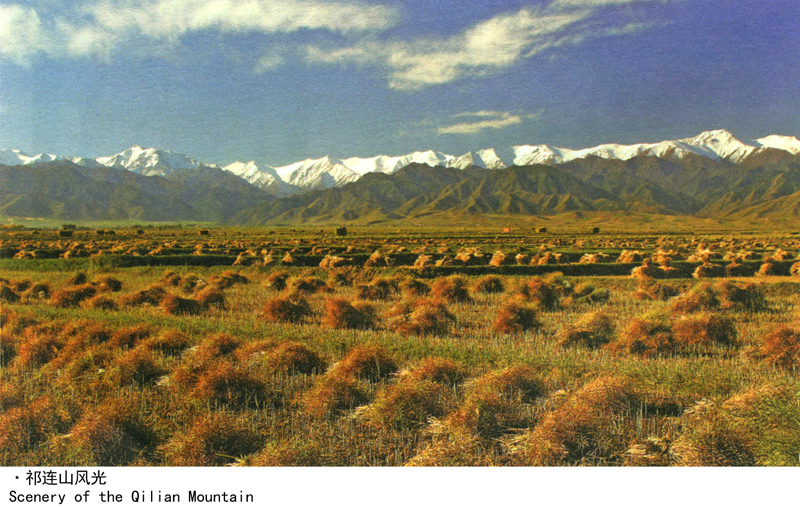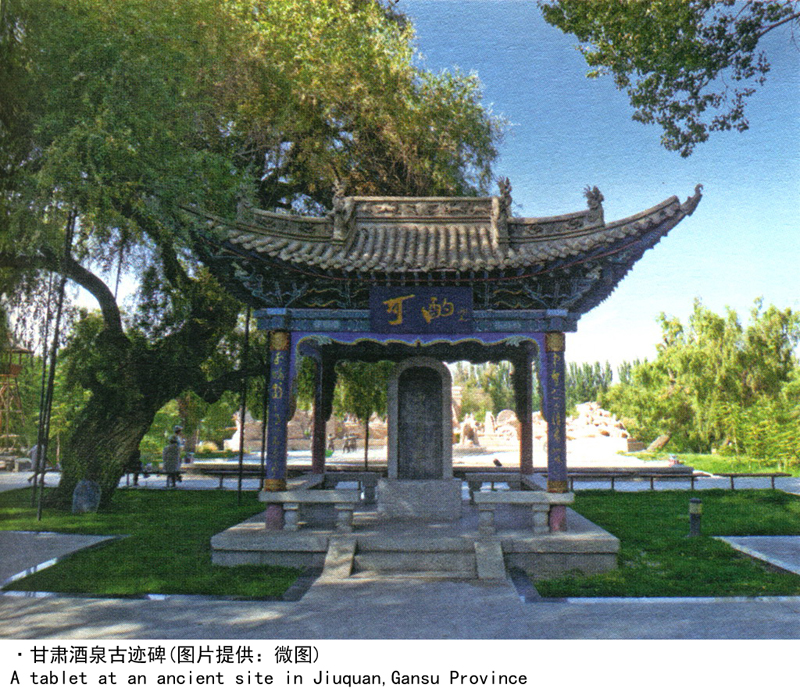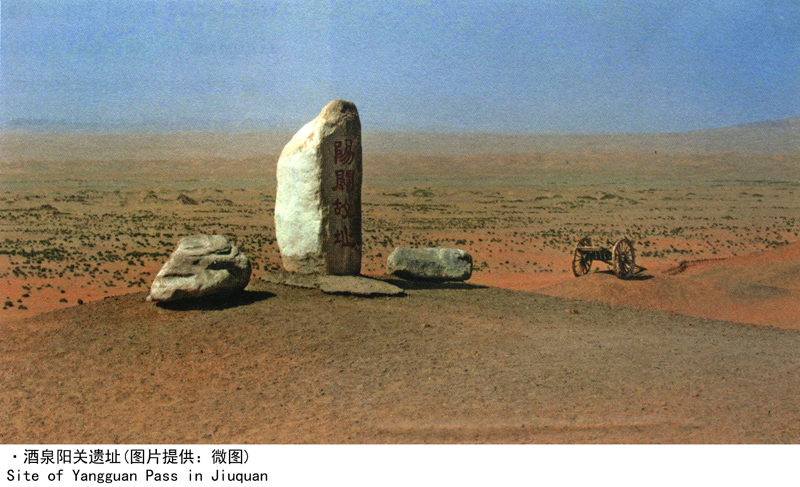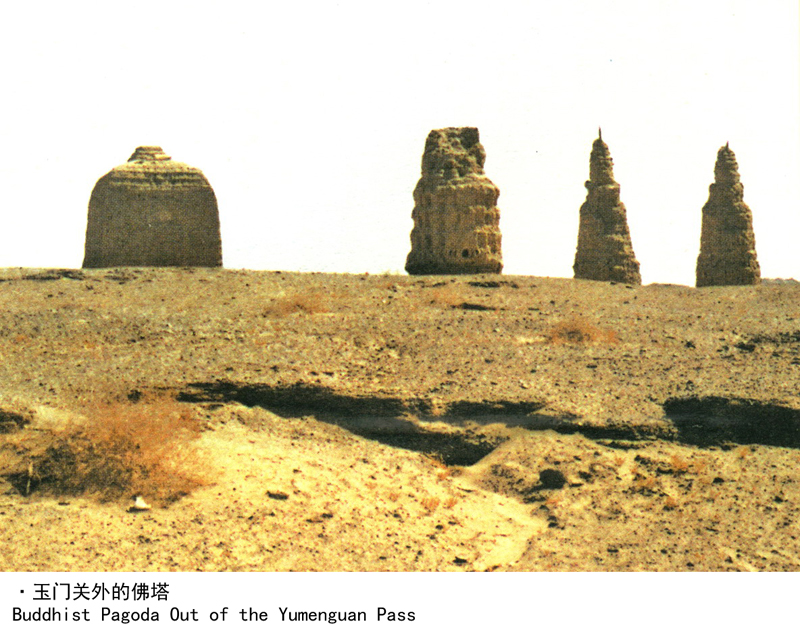丝路概说
- 交通路线
- 长安与丝绸之路
- 从长安到罗马——汉唐丝路全程探行纪实上
- 从长安到罗马——汉唐丝路全程探行纪实下
- 海上丝路史话
- 丝绸之路史研究
- 早期丝绸之路探微
- 早期丝绸之路文献研究
- 中西丝路文化史
- 沧桑大美丝绸之路
- 传播友谊的丝绸之路
- 路途漫漫丝貂情——明清东北亚丝绸之路研究
- 世界的中国——丝绸之路
- 丝绸之路
- 丝绸之路寻找失落的世界遗产
- 丝绸之路2000年
- 丝绸之路——从西安至帕米尔
- 丝绸之路经济带发展报告2014
- 丝绸之路考古十五讲
- 丝绸之路——神秘古国
- 丝绸之路——沿线城镇的兴衰
- 丝绸之路在中国
- 丝路景观
- 丝路起点长安
- 丝路文化新聚焦
- 丝路之光——创新思维与科技创新实践
- 中国丝绸之路交通史
- 中华文明史话-敦煌史话
- 中国·北海合浦海上丝绸之路始发港理论研讨会论文集
- 丝绸之路
- 丝绸之路新史
- 西域考古文存
- 丝绸之路的起源
▲酒泉
作者:方明




酒泉位于甘肃省西北部,河西走廊西端的阿尔金山、祁连山与马鬃山之间。据考古资料、文化遗存和文字记载,古代的酒泉林木茂密,草地广布,野生动物资源丰富。早在4000多年前这里就有人类定居,畜牧业已很发达,并有了原始的农业和纺织业生产。优越的地理环境,富饶的自然资源,为这块肥美的土地较早地被人们开发利用提供了必要而有利的条件。
秦汉以前,酒泉地区是古代游牧民族羌人、戎人的聚居地。西汉初年,整个河西地区被月氏人独占。到汉文帝年间,月氏人在匈奴的侵略之下大部退出河西地区,酒泉一带成为匈奴的驻牧地。公元前121年霍去病进军河西,把匈奴驱逐到玉门关外。据说在河西战役期间,汉武帝特地从长安送来一坛美酒赐给霍去病,霍去病没有独自享用,而是将酒倒入泉水中,让全军将士共饮。后来此泉就称为酒泉,而“酒泉”这个地名也因此而来。西汉中期,朝廷设立河西四郡,酒泉郡就是其中之一。东汉初,丝绸之路因战乱被切断。汉明帝永平十五年(72),东汉大将窦固从酒泉出征,击败了北匈奴,又一次打开了通往西域的大门。从此,中西贸易畅通,往来频繁,酒泉也成为丝绸之路上的重要城市。
>Jiuquan
Lying between the Arjin Mountain,Qilian Mountain and Mazong Mountain,Jiuquan is Located in northwestern Gansu and the west end of the Hexi Corridor.Based on archeological records,cultural relics and local journals,Jiuquan in ancient times was a land of dense forests,vast grassland,and abundant wildlife resources.As early as some four thousand years ago,mankind began to settle in the area,with rather advanced animal husbandry and primitive forms of agriculture and textile industry.The superior geographical environment and rich natural resources offered necessary and favorable conditions for mankind's early development and utilization of this fertile land.
Prior to the Qin and the Han dynasties,Jiuquan area was the settlement for ancient nomadic peoples such as the Qiangs and the Rongs.In early years of the Western Han Dynasty,the entire Hexi region was occupied by the Yuezhi people.By the time of Emperor Wen of the Han Dynasty,majority of the Yuezhi people withdrew from the Hexi region due to the Huns invasion.Jiuquan area virtually became the Huns ranching ground.In 121 B.C.,General Huo Qubing's army advanced to the Hexi region and expelled the Hun army out of the Yumenguan Pass.It is said that during the campaign to retrieve the Hexi region,Emperor Wu specially rewarded General Huo Qubing a jar of fine wine from Chang'an for his distinguish service.But General Huo did not enjoy the wine alone.Instead he poured the wine into the local spring water so that his soldiers could all enjoy the wine.This spring was named Jiuquan(Spring of Wine)since then.Eventually the entire area adopted the name of the spring.By mid-Western Han Dynasty,the imperial court established four counties around the Hexi region and Jiuquan was one of them.In the early Eastern Han Dynasty,trade on the Silk Road was suspended due to the wars.In 72 A.D.,General Dou Gu set off from Jiuquan on an expedition and eventually defeated the northern Hun army,thus reopened the gate to Western Regions.Since then trade between Central Plains and Western Regions became smooth and frequent.Jiuquan became an important portal on the Silk Road.
阳关和玉门关
著名的阳关和玉门关是丝路南路和北路的重要关隘,玉门关位于敦煌城西北,因和田美玉由此输入得名;阳关位于敦煌城西南,因在玉门关之阳(古代山南水北称为“阳”)而得名。敦煌、玉门关、阳关在位置上形成三角形,两关一南一北,扼守着这座丝路名城。自古以来,历代文人对玉门关和阳关吟咏不绝,两关因此声名远播。唐代边塞诗人王之涣的名句“春风不度玉门关”,写出玉门关一带景物荒凉、行旅艰难的画面。另一位唐代诗人王维的《渭城曲》中有千古名句“劝君更尽一杯酒,西出阳关无故人”,情景交融,真挚感人,后来被谱入乐府,一唱三叹,就是著名的《阳关三叠》。
Yangguan Pass and Yumenguan Pass
The famous Yangguan Pass and the Yumenguan Pass are important passes on the northern and the southern routes of the Silk Road respectively.Yumenguang Pass is located northwest of the Dunhuang city .It got the name because the famous Hetian(Khotan)jade entered the Dunhuang from here;Yangguan Pass is located southwest of the Dunhuang city.It got the name because it is located south of the Yumenguang Pass and ancient people addressed〝south of the mountain or north of the river"as Yang.Dunhuang,Yumenguan Pass and Yangguan Pass together form an array of triangle with the two passes guarding this important Silk Road city from the northwest and southwest directions respectively.Since ancient times,many literati incessantly chanted about the two passes,making their fame travel far and wide.Wang Zhihuan,a prominent Tang Dynasty frontier poet wrote the following well-quoted line〝Spring breeze does not visit the Yumenguang Pass",describing the desolate scene at the Yumenguang Pass area and the hardships when traveling around.Another Tang Dynasty poet Wang Wei wrote in his poem-of-all-ages〝Song of Wei City"(Wei Cheng Qu):〝l toast you another drink,as there will be no old friends west of the Yangguan Pass".It is a blended scene with emotions,very sincere and touching.Later the poem was set to music.With three repetitions of the same verse,the piece became the famous music piece〝Parting in Yangguan".
丝绸之路/方明编著.-合肥: 黄山书社, 2013;